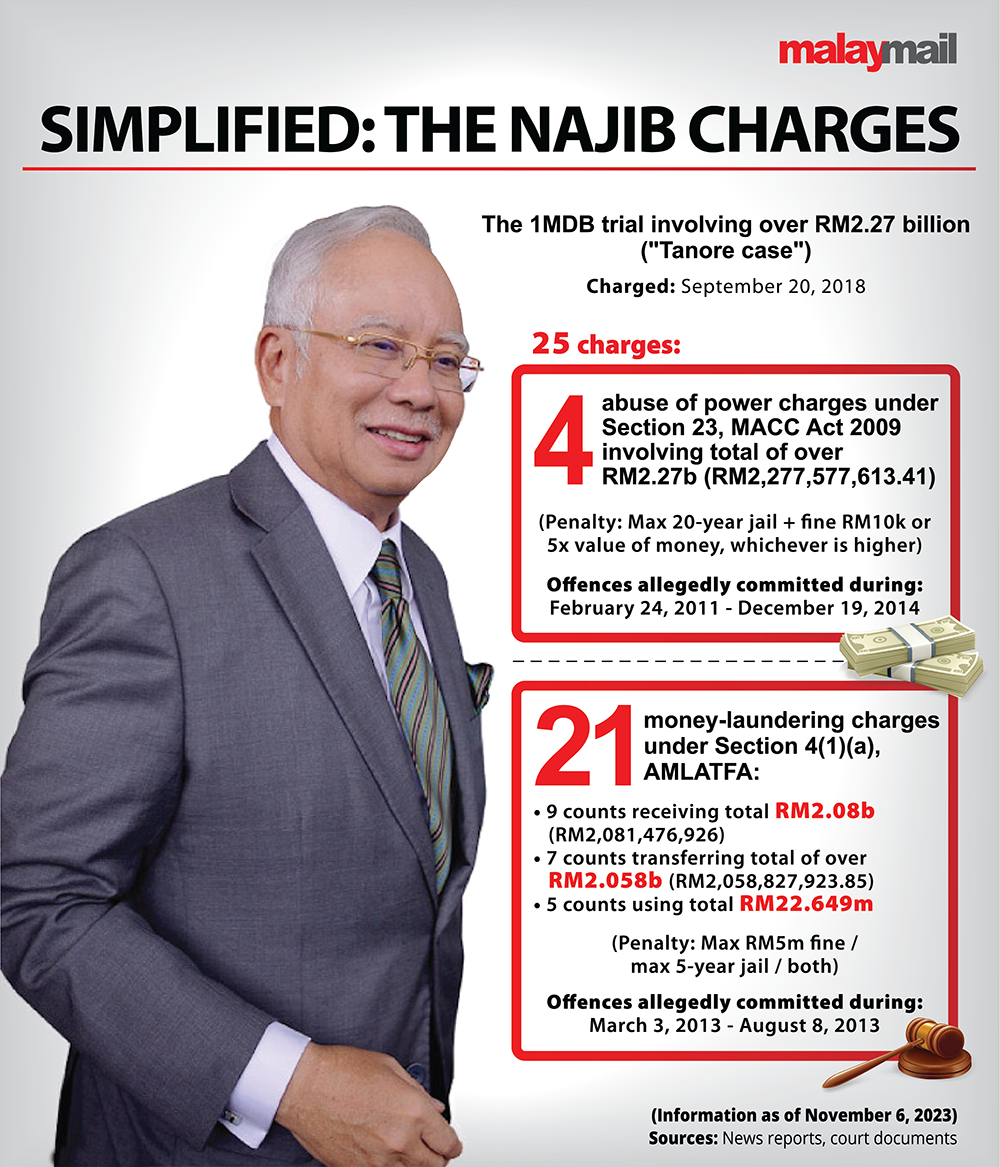PUTRAJAYA, Jan 13 — Datuk Seri Najib Razak today insisted that he as the prime minister was allowed to receive gifts as long as it does not affect his integrity, denying that it was ethically wrong for him to have accepted billions of ringgit which he claims were Saudi Arabia’s King Abdullah’s “donations”.
Today, when testifying in his own defence in the trial over RM2 billion of 1Malaysia Development Berhad’s (1MDB) funds that were alleged to have entered his personal AmIslamic bank accounts, Najib continued to insist that the money came from Saudi donations instead.
Under cross-examination by deputy public prosecutor Kamal Baharin Omar, Najib disagreed that he had the responsibility to declare to his Cabinet that he had received the purported donations from King Abdullah in his personal AmIslamic bank accounts.
Najib denied that he had never informed his Cabinet about the alleged donations, saying that he did tell his Cabinet “in general” that King Abdullah would provide support, but said he did not say so in detail.
Najib explained the reason he did not tell his Cabinet in detail was because “this is a personal donation, although it is for CSR purposes and to support my leadership, but it is given personally.”
Najib said he had as prime minister only informed his Cabinet once about the alleged “support” from King Abdullah, instead of each time the money came into his personal bank accounts.
Kamal Baharin then showed Najib two sets of the Malaysian government’s Code of Ethics for Members of the Administration.
The first set of Code of Ethics was dated 1997, while the newer version did not have a date. Najib said he was generally familiar with the first set, confirming that it also applied to him when he was the prime minister and finance minister.
Najib served as prime minister from April 2009 to May 2018 and as finance minister from September 2008 to May 2018.
Kamal Baharin read out from the Code of Ethics, with its item five stating that “members of the administration should avoid using their position for personal interests such as seeking or accepting any gifts, rewards or facilities that could affect their integrity”.
When asked if he agreed this meant that the prime minister cannot receive any gifts, Najib disagreed that it meant that a prime minister could not receive any gifts at all, highlighting that the Code of Ethics referred to gifts “that could affect integrity”.
“I don’t agree, if the gift causes us to make decisions, then only cannot,” Najib said, adding that the sentence should be read as a whole and not in isolation as it would be confusing.
Najib said gifts could be accepted if the gifts “do not affect our power, our position or our integrity”, stressing that there should not be a piecemeal approach to this code for ethical conduct.
Kamal Baharin: Based on this paragraph, when you received the purported donation from King Abdullah, you have to tell the Cabinet.
Najib: No.
Kamal Baharin read out another excerpt under item 8 (vi) of the same Code of Ethics, which stated that members of the Administration are prohibited to own sources of wealth or property that are disproportionate or cannot legitimately be expected to have been obtained by them through their emoluments or any legitimate personal income.
Kamal Baharin said this too meant that Najib could not accept the purported Saudi donation, but Najib disagreed as he said he did not receive it for personal purposes.
After showing the newer set of Code of Ethics that had the same wordings, Kamal Baharin then suggested the two Code of Ethics means Najib has to inform Cabinet about his receiving of money from King Abdullah. But Najib disagreed.
When asked if he remembered how many times he told the Cabinet about King Abdullah’s alleged support, Najib said he did not really remember and would check.
Najib was asked if he had informed his Cabinet before the 2013 election of the money that he had received as purported Saudi donations during 2011 to 2013, and if he had told his new Cabinet formed after the 2013 election of the additional money he received in 2014.
For both questions, Najib said he would check.
Among other things, Najib claimed that the alleged individual named “Saud Abdulaziz Majid Al Saud” — who purportedly wrote four letters promising donations to him — actually exists as the Malaysian Anti-Corruption Commission (MACC) had gone to meet him.
Najib however confirmed he never met Saud and does not know how the latter is related to King Abdullah.
But Najib insisted that he believes Saud is a member of Saudi’s royal family, as the letters had used Saudi Arabia’s emblem and had stated “Al Saud” in Saud’s full name.
Najib said he knew the emblem cannot be used by ordinary citizens, and that Saudi Arabia’s history meant that only those of royal lineage belonging to the House of Saud could use the name “Al Saud”.
Najib disagreed that Saud’s letters were written in a personal tone and these letters did not represent Saudi Arabia or the Saudi royal family or King Abdullah, insisting that these letters were written on King Abdullah’s instructions and were not bogus letters.
Najib indicated it would not make sense for Saud to suddenly want to make personal donations — unless the donation came from King Abdullah — as both he and Saud did not know each other.
Najib’s 1MDB trial before judge Datuk Collin Lawrence Sequerah resumes tomorrow.




















